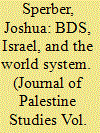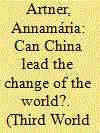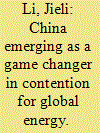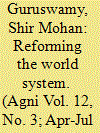|
|
|
Sort Order |
|
|
|
Items / Page
|
|
|
|
|
|
|
| Srl | Item |
| 1 |
ID:
142750


|
|
|
| 2 |
ID:
175055


|
|
|
|
|
| Summary/Abstract |
Currently, the world system is in a state of complex crisis and transformation. The overall influence of its US-led centre has weakened, and most of the global periphery is in either chaos or misery. The mechanisms of the global accumulation of capital prevent new global leaders from emerging. Until now, China’s economic ascent has been based on managed market forces and sovereign monetary policy. However, if the liberalisation of capital flows in China continues, the country’s financial independence might be lost. This article explains how the nodal crisis of global capitalism has evolved, how far the marketisation and financial liberalisation of the Chinese economy has gone and the largest obstacles to China further strengthening its influence on the world order. The author concludes that China could play a positive role as a new superpower in constructing a world beyond capitalism, if it does not give up the socialist project, keeps market forces under control, maintains accumulation without dispossession, preserves its financial independence and makes alliances with other nations on the global (semi-)periphery. The latter is particularly important, as the present hegemonic centre will not give up its position peacefully.
|
|
|
|
|
|
|
|
|
|
|
|
|
|
|
|
| 3 |
ID:
143612


|
|
|
|
|
| Summary/Abstract |
China’s rise as a global power features its unyielding contention with the West for domination in the world system. Such contention manifests itself conspicuously in the control of global energy governance as China has a more urgent need to secure its energy supply to sustain its economic growth. Viewed in a historical perspective, in the arena of global energy politics and markets, China has incrementally evolved through the stages of development from starting as a passive rule-conformist to later becoming an assertive challenger and ultimately a game changer. The year 2008 was seemingly a turning point for the rise of “China Inc.” as the financial crisis that swept across the West provided an unprecedented opportunity for China to march into the resource-rich regions of the world without encountering much resistance from its contenders. What is worth noting is that China’s market expansion was spearheaded by its unique state-owned energy corporations that carried out business strategies almost unrivaled by its western counterparts. China’s intention to change the rules of the game in global energy governance can also be seen in its ongoing efforts to construct an alternative normative structure and institutional means to undermine the Western dominion.
|
|
|
|
|
|
|
|
|
|
|
|
|
|
|
|
| 4 |
ID:
184019


|
|
|
|
|
| Summary/Abstract |
IN HIS classic book On War, the eminent 19th century German military theorist Carl von Clausewitz generalized the experience of the Napoleonic wars: "The art of war ... makes War of all branches of human activity the most like a gambling game."1 It seems that since the time when Clausewitz defined war as "the continuation of policy by other means," the nature of world politics has not changed in real terms: brinkmanship, bluff, risky moves and, alas, cheating. History teaches us that the more ambitious the ruling elite, the more they tend to overstep the bounds of the permissible.
|
|
|
|
|
|
|
|
|
|
|
|
|
|
|
|
| 5 |
ID:
179237


|
|
|
|
|
| Summary/Abstract |
Since the disintegration of the bipolar world, China's role in global and regional affairs has increased dramatically, prompting Chinese expert circles to undertake theoretical studies on important issues such as state economic interests, national security, and geostrategy for global and regional trade. Beijing has developed a long-term foreign policy, the essence of which is the following formula: "Appease the West, lean on the North, fight for the East and the South." It is believed that China as a state in the eastern part of Eurasia simply must develop strategic partnerships with the leading powers of the Eurasian continent, such as Germany, Russia, and India, because only through the process of "independent" and "joint" transformation with them can China finally become the main driving force of the changing world system. Its powerful economic potential allows Beijing to have a noticeable impact on the geopolitical situation in Eurasia and pursue an independent foreign economic policy.
|
|
|
|
|
|
|
|
|
|
|
|
|
|
|
|
| 6 |
ID:
097692


|
|
|
| 7 |
ID:
096005


|
|
|
| 8 |
ID:
170650


|
|
|
|
|
| Summary/Abstract |
The notion of semiperiphery refers to specific, delimited, observable and geographically referenced spaces: the semiperipheries fulfil a complex structural function and are not common in the world system. In this way, what countries have transited through these ascending/descending mobilities and now make up the semiperiphery? This article not only presents an extensive theoretical review of the concept of semiperiphery but also demonstrates the coexistence of two groups of states in the semiperiphery: the first, the high or strong, semiperiphery, is composed of the so-called regional powers; the second, the low or weak, semiperiphery, is made up of a group that has been little studied so far and that can be named as secondary regional states. Due to an increase in their material and immaterial capacities, the regional powers entered into a dynamic of rise in the first decade of the twenty-first century and, with this, they strengthened their position in the international structure; secondary regional states did not stand out due to their emergence, but they significantly increased their semi-material capacities, which places them on the path of development. However, none of the cases have overcome their situation and semiperipheral nature.
|
|
|
|
|
|
|
|
|
|
|
|
|
|
|
|
|
|
|
|
|